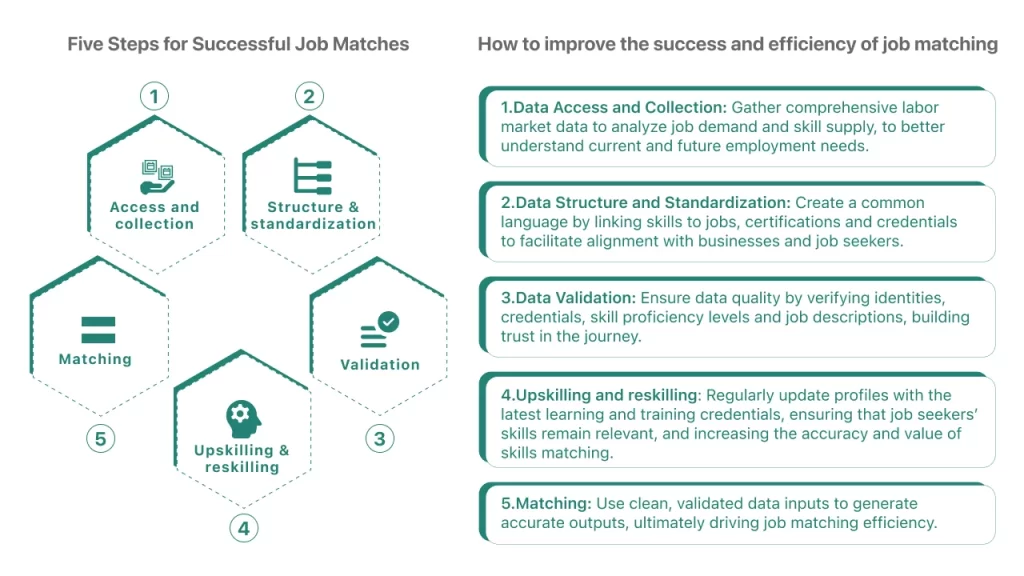
Do you know artificial intelligence (AI) is reinventing human resources (HR) practices? With the help of deep technology solutions such as machine learning, natural language processing, computer vision, and predictive analytics, recruitment is transforming into a data-driven, intelligent decision-making exercise.
The job market is in flux due to technological disruption, skill gaps, and demographic shifts. To meet evolving HR demands, AI is proving to be a great tool to redefine talent acquisition and management: how companies find, evaluate, hire, retain, and grow employees.
How is AI Recruitment Reshaping Hiring?
AI is reshaping hiring by introducing innovations such as automated candidate sourcing, deep candidate screening, algorithmic matching, chatbot-candidate engagement, AI-driven virtual interviews, and many more. Each innovation promises to change recruitment as we know it forever.
1) AI-driven Automated Sourcing of Candidates
Many vacancies go unfilled for months because there are no suitable candidates. Sometimes there are no applicants because the job board may not have the right reach. More importantly, the right fit candidate may not be looking for a new role.
No worries, calling AI to the rescue of hapless HR managers!
Passive Candidate Discovery – Role, Skill & Project Match to Find Hidden Gems
Without relying solely on resumes, AI algorithms can source the best candidates who remain outside the radar of traditional hiring sources. To track passive candidates, AI traces work linked to an organization’s role, skill, or project requirements.
For this, AI analyzes material in the public domain: research papers, professional and social media platforms, industry associations, technical communities, academic databases, corporate and public profiles, and job and gig work sites. AI then makes predictive match recommendations.
2) AI-assisted Priming of Job Descriptions
Many job postings attract irrelevant applications because the job description may have used trendy, technical, or vague terms, attracting the wrong talent. Worse, poorly framed JDs miss out on the right candidates who do not find the wording reflecting their skills.
Luckily, AI is here to save precious time for HR managers!
Job Description Optimization – Reducing Hiring Risks to Ensure Right Fit
To prevent costly mis-hires, AI-powered recruiters use predictive analytics to analyze market trends, career trajectories, and career-switch patterns. Weeding out applicants who may leave prematurely, stagnate, or struggle to fit in, AI identifies qualified long-term hires based on future potential, not just current skills.
Inferring learnability from past roles, achievements, and experience, AI analyzes the transferability of capabilities across industries. AI uses relevant keywords aligned to the industry, career stage, and professional aspirations to identify relevant candidates.
3) AI-powered Candidate Engagement
Shortlisting candidates from a flood of applications and holding the first round of interviews is an onerous responsibility. It can be exhausting for the average human recruiter, and the process can be subjective, affecting candidate experience.
AI chatbots provide real-time status updates with personalized engagement!
First Contact Interactions –Dynamic, Contextual, and Cross-validated Questions
AI chatbots can interview a large volume of a narrowed-down list of candidates consistently and fairly, and select better candidates for the next stage. AI chatbots are trained to vary the questions and use multi-step, scenario-based questioning to personalize the formats of interviews.
An AI interviewer (algorithm) simultaneously cross-checks data available on candidates through the resume, social media, application tracking system (ATS), candidate relationship management (CRM) system, published works, preliminary tests, etc, to confirm the veracity of answers received.
With objective filtering and bias reduction, conversational AI uses predefined criteria to eliminate unsuitable candidates.
4) AI-backed Skills Assessments
HR managers struggle with the manual conduct of tests that are not in tune with the real-world demands of the role. Candidates are known to game the tests as they can get away with memorized answers, theoretical knowledge, and guessing multiple-choice answers.
AI-based skill assessments automate role-specific skill and aptitude validation.
The World Economic Forum has just underscored the need to match talent to the jobs of tomorrow.
World Economic Forum Framework for Successful Job Matching

Holistic Multi-Criteria Evaluations – Gamified Tests for Skills, Capabilities and Behavioral Indicators
A unique and fool-proof method pioneered by ValueMatrix.ai, AI gamification of assessments, not only checks for task-specific abilities but also gauges soft skills for learning speed and adaptive thinking.
Our proprietary AI algorithm tracks macro and micro expressions, behavioral data including keystrokes and mouse movements, general demeanor, body language, facial expressions, response consistency, and cognitive patterns.
A combination of psycholinguistics and computational psychometrics enables HR departments to make data-backed hiring decisions.
5) Self-learning AI Recruitment Solution
HR professionals are human and prone to fatigue, be it reviewing applications, conducting interviews, or making decisions. They may lack data to refine selection criteria and fail to hire for long-term fit; they often focus on filling positions rather than ensuring alignment with company goals.
Enter smart AI solutions that learn what works and build upon it.
Refining Algorithms for Talent Selection – Hiring a Future-ready Workforce
AI recruitment software is equipped to incorporate post-hire performance data and improve the selection and prediction algorithms. Evolving with every hiring cycle, the AI algorithm continuously learns from past fraud attempts; it keeps pace with technologies designed to get past AI assessments –voice cloning, deepfakes, psychometric test crackers, etc.
It also learns from successful hires by identifying behavior patterns, shared skills, common personality traits, and working styles to create a feedback loop that improves candidate evaluation.
Data That Backs the Use of AI in Recruitment
According to an SHRM survey conducted among 2,366 HR respondents representing organizations of all sizes in a wide variety of industries across the U.S. in January 2024, one in four organizations is using AI to support HR-related functions. Of those who use AI for recruiting,
- 65 percent are using it to help generate job descriptions
- 42 percent are using it to customize job postings
- 33 percent are using it to review or screen applicant resumes, communicate with applicants during the interview process, or automate candidate searches.
Recruiters said AI helps them:
- Save time
- Increase efficiency
- Identify top candidates and
- Reduce recruitment costs
AI is emerging as a powerful HR hiring tool. With the added benefit of human oversight, organizations can build smarter, diverse, high-performing, and sustainable teams with a thriving culture that drives success and growth.


